数词(英语语法第14章)导学案(3含答案)-2025届高三英语复习专项
文档属性
| 名称 | 数词(英语语法第14章)导学案(3含答案)-2025届高三英语复习专项 |
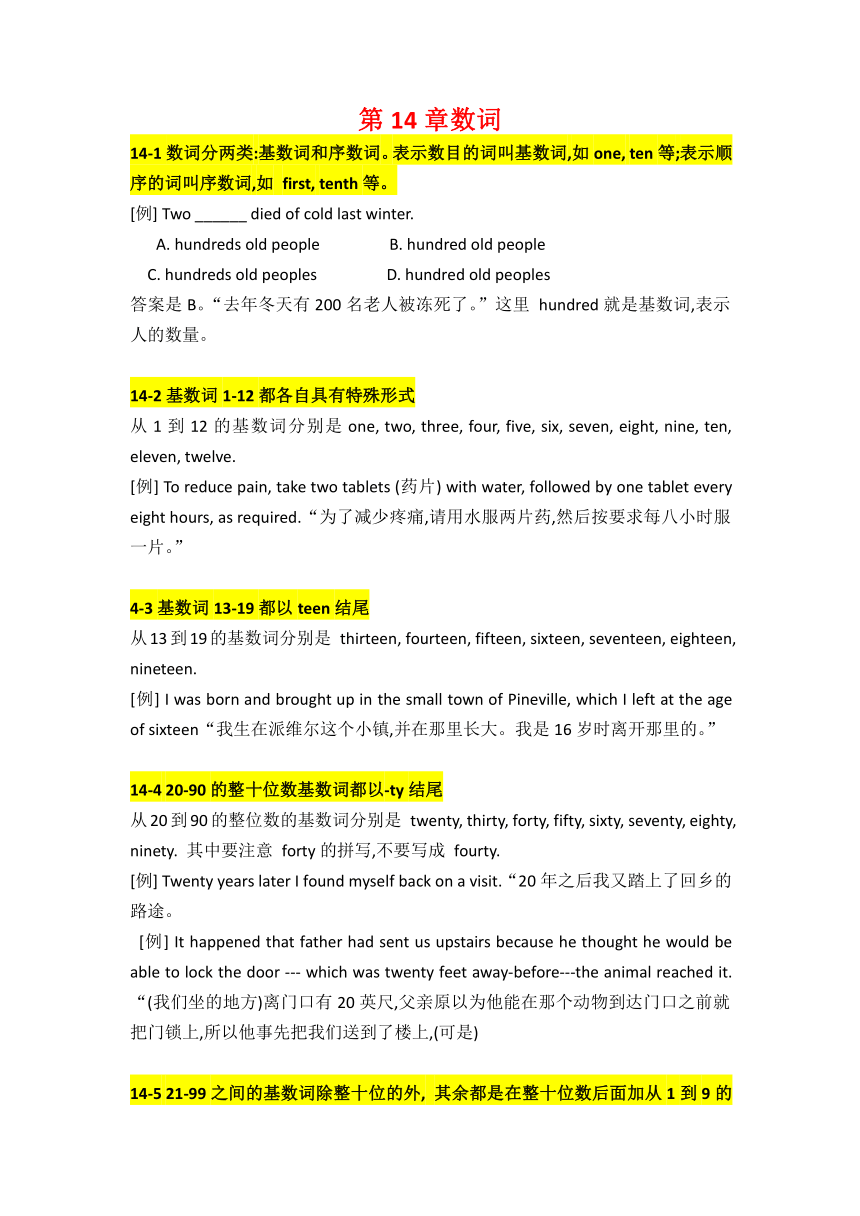
|
|
| 格式 | docx | ||
| 文件大小 | 682.2KB | ||
| 资源类型 | 教案 | ||
| 版本资源 | 人教版(2019) | ||
| 科目 | 英语 | ||
| 更新时间 | 2025-02-11 12:51:00 | ||
图片预览

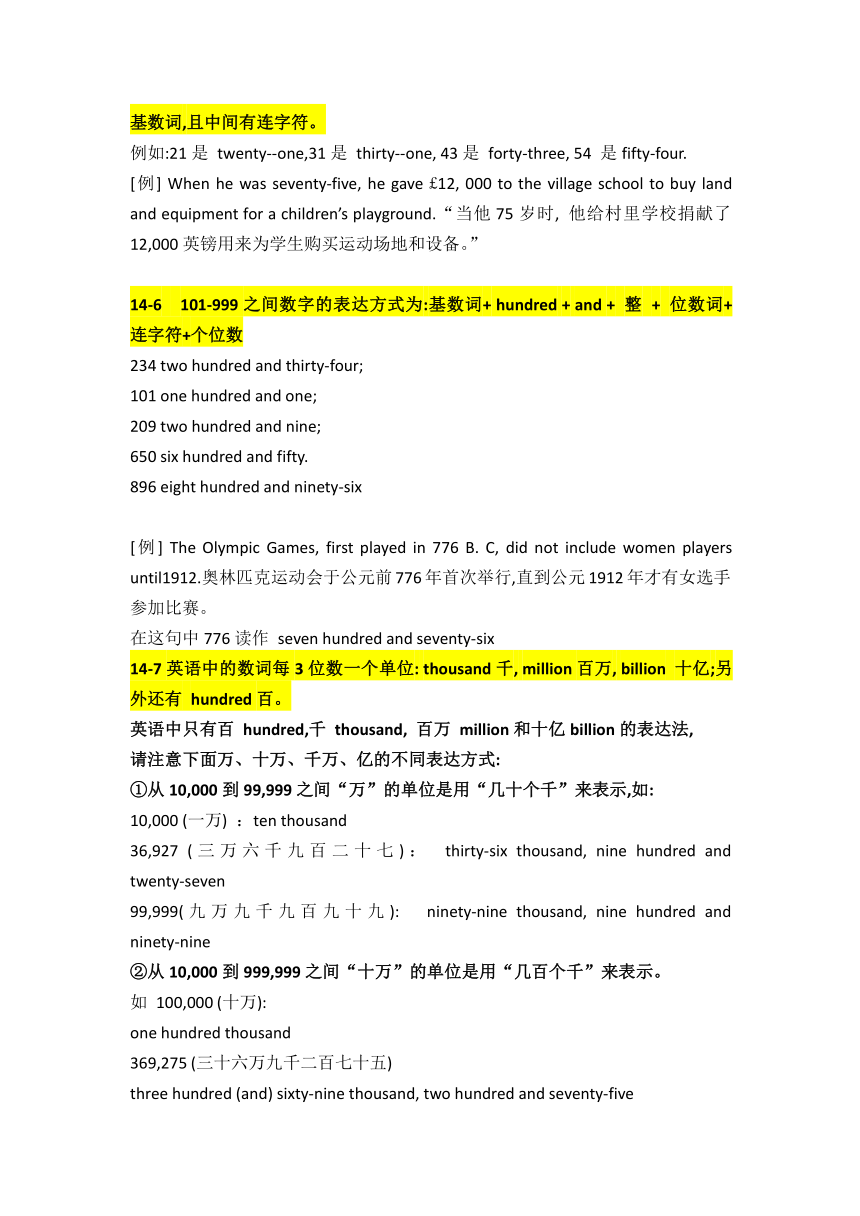
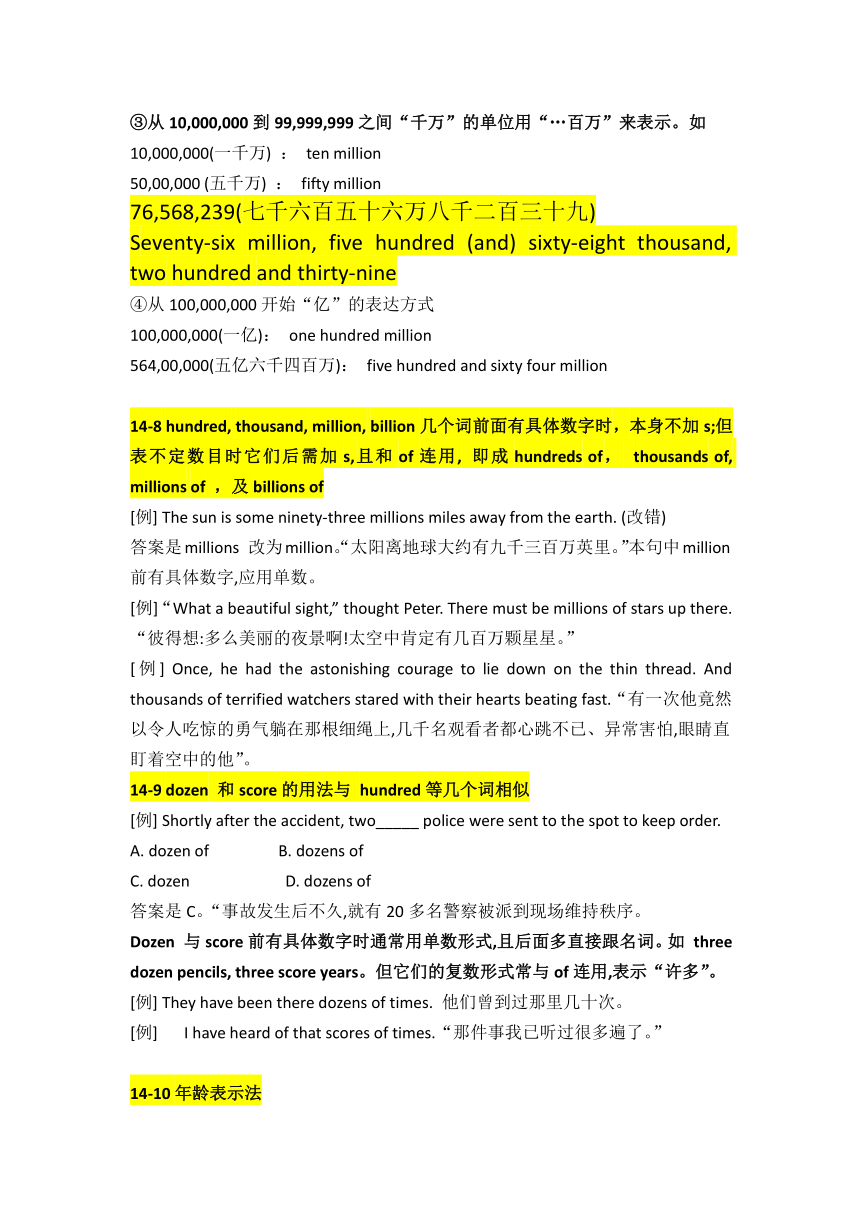
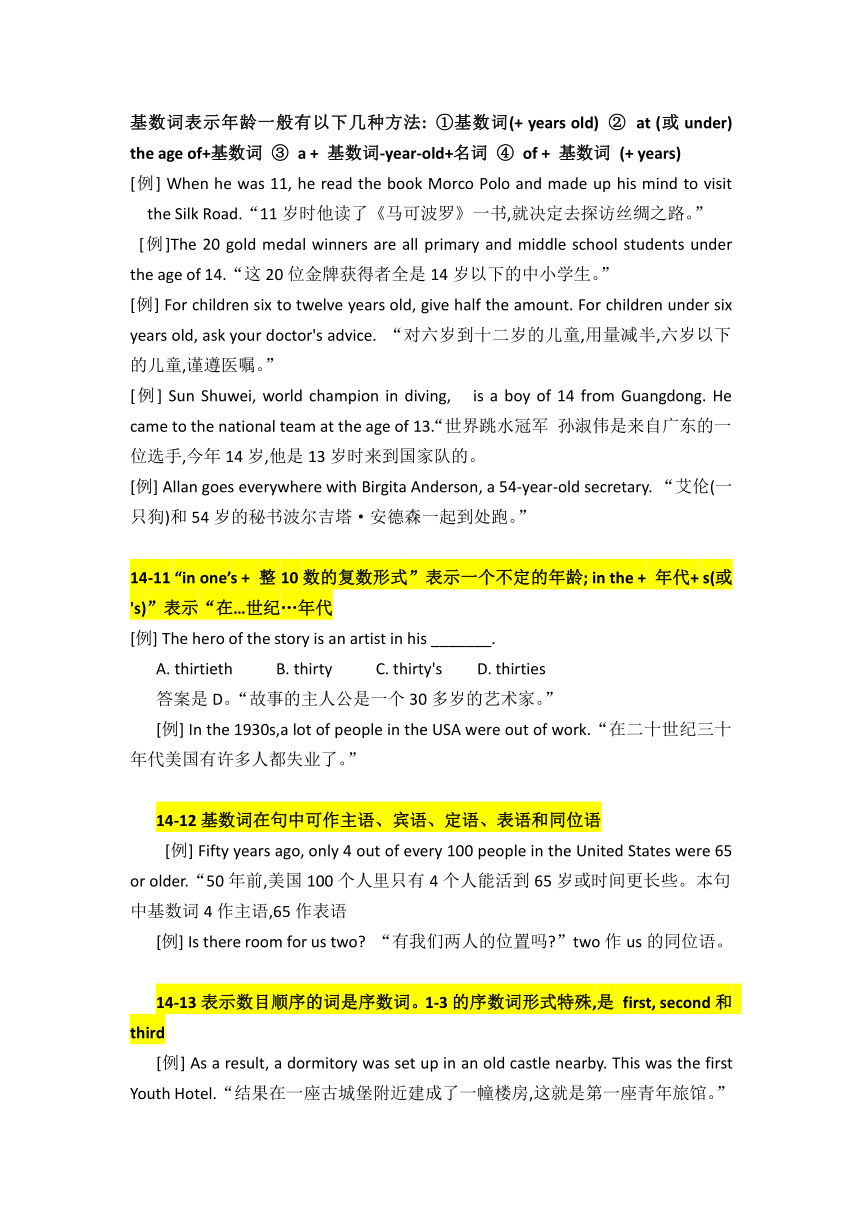
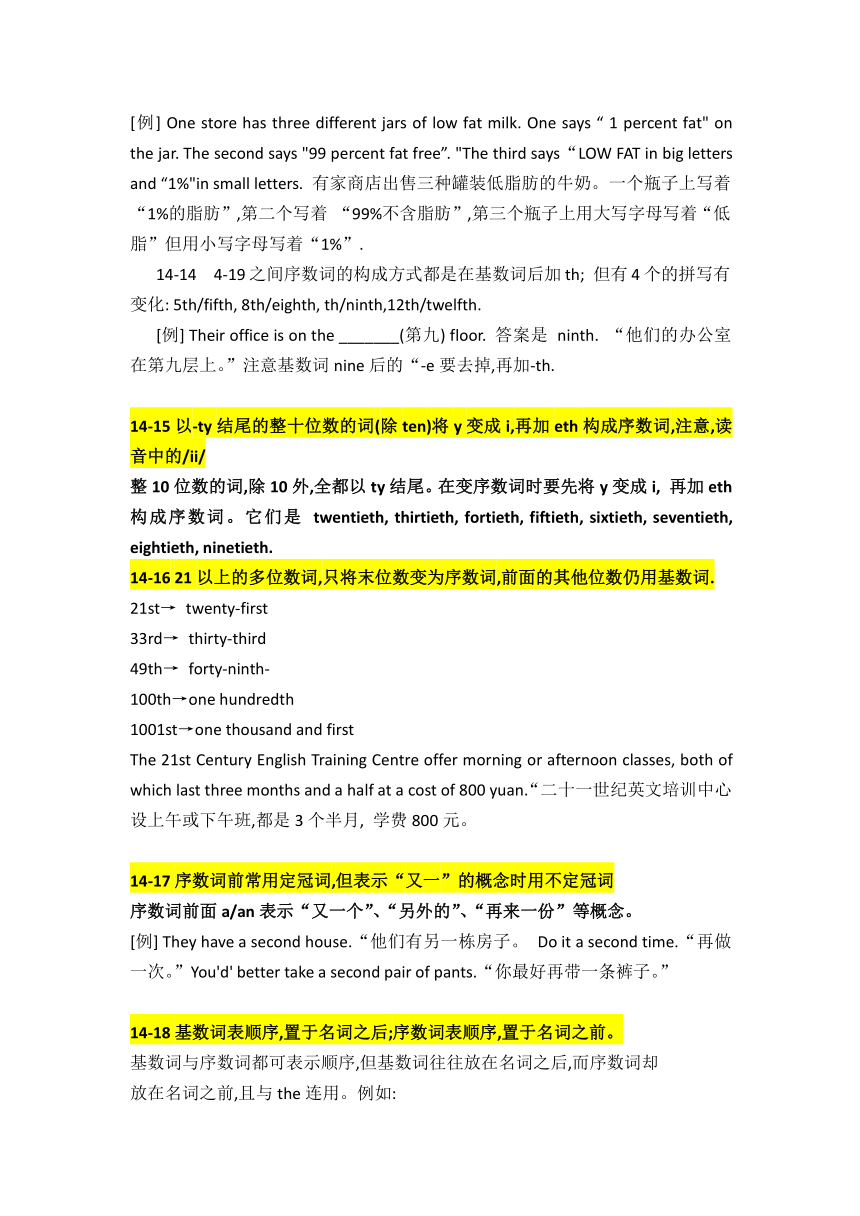
文档简介
第14章数词
14-1数词分两类:基数词和序数词。表示数目的词叫基数词,如one, ten等;表示顺序的词叫序数词,如 first, tenth等。
[例] Two ______ died of cold last winter.
A. hundreds old people B. hundred old people
C. hundreds old peoples D. hundred old peoples
答案是B。“去年冬天有200名老人被冻死了。”这里 hundred就是基数词,表示人的数量。
14-2基数词1-12都各自具有特殊形式
从1到12的基数词分别是one, two, three, four, five, six, seven, eight, nine, ten, eleven, twelve.
[例] To reduce pain, take two tablets (药片) with water, followed by one tablet every eight hours, as required.“为了减少疼痛,请用水服两片药,然后按要求每八小时服一片。”
4-3基数词13-19都以teen结尾
从13到19的基数词分别是 thirteen, fourteen, fifteen, sixteen, seventeen, eighteen, nineteen.
[例] I was born and brought up in the small town of Pineville, which I left at the age of sixteen“我生在派维尔这个小镇,并在那里长大。我是16岁时离开那里的。”
14-4 20-90的整十位数基数词都以-ty结尾
从20到90的整位数的基数词分别是 twenty, thirty, forty, fifty, sixty, seventy, eighty, ninety. 其中要注意 forty的拼写,不要写成 fourty.
[例] Twenty years later I found myself back on a visit.“20年之后我又踏上了回乡的路途。
[例] It happened that father had sent us upstairs because he thought he would be able to lock the door --- which was twenty feet away-before---the animal reached it.“(我们坐的地方)离门口有20英尺,父亲原以为他能在那个动物到达门口之前就把门锁上,所以他事先把我们送到了楼上,(可是)
14-5 21-99之间的基数词除整十位的外, 其余都是在整十位数后面加从1到9的基数词,且中间有连字符。
例如:21是 twenty--one,31是 thirty--one, 43是 forty-three, 54 是fifty-four.
[例] When he was seventy-five, he gave 12, 000 to the village school to buy land and equipment for a children’s playground.“当他75岁时, 他给村里学校捐献了12,000英镑用来为学生购买运动场地和设备。”
14-6 101-999之间数字的表达方式为:基数词+ hundred + and + 整 + 位数词+连字符+个位数
234 two hundred and thirty-four;
101 one hundred and one;
209 two hundred and nine;
650 six hundred and fifty.
896 eight hundred and ninety-six
[例] The Olympic Games, first played in 776 B. C, did not include women players until1912.奥林匹克运动会于公元前776年首次举行,直到公元1912年才有女选手参加比赛。
在这句中776读作 seven hundred and seventy-six
14-7英语中的数词每3位数一个单位: thousand千, million百万, billion 十亿;另外还有 hundred百。
英语中只有百 hundred,千 thousand, 百万 million和十亿billion的表达法,
请注意下面万、十万、千万、亿的不同表达方式:
①从10,000到99,999之间“万”的单位是用“几十个千”来表示,如:
10,000 (一万) :ten thousand
36,927 (三万六千九百二十七): thirty-six thousand, nine hundred and twenty-seven
99,999(九万九千九百九十九): ninety-nine thousand, nine hundred and ninety-nine
②从10,000到999,999之间“十万”的单位是用“几百个千”来表示。
如 100,000 (十万):
one hundred thousand
369,275 (三十六万九千二百七十五)
three hundred (and) sixty-nine thousand, two hundred and seventy-five
③从10,000,000到99,999,999之间“千万”的单位用“…百万”来表示。如
10,000,000(一千万) : ten million
50,00,000 (五千万) : fifty million
76,568,239(七千六百五十六万八千二百三十九)
Seventy-six million, five hundred (and) sixty-eight thousand, two hundred and thirty-nine
④从100,000,000开始“亿”的表达方式
100,000,000(一亿): one hundred million
564,00,000(五亿六千四百万): five hundred and sixty four million
14-8 hundred, thousand, million, billion几个词前面有具体数字时,本身不加s;但表不定数目时它们后需加s,且和of连用, 即成hundreds of, thousands of, millions of ,及billions of
[例] The sun is some ninety-three millions miles away from the earth. (改错)
答案是millions 改为million。“太阳离地球大约有九千三百万英里。”本句中million前有具体数字,应用单数。
[例]“What a beautiful sight,” thought Peter. There must be millions of stars up there.“彼得想:多么美丽的夜景啊!太空中肯定有几百万颗星星。”
[例] Once, he had the astonishing courage to lie down on the thin thread. And thousands of terrified watchers stared with their hearts beating fast.“有一次他竟然以令人吃惊的勇气躺在那根细绳上,几千名观看者都心跳不已、异常害怕,眼睛直盯着空中的他”。
14-9 dozen 和score的用法与 hundred等几个词相似
[例] Shortly after the accident, two_____ police were sent to the spot to keep order.
A. dozen of B. dozens of
C. dozen D. dozens of
答案是C。“事故发生后不久,就有20多名警察被派到现场维持秩序。
Dozen 与score前有具体数字时通常用单数形式,且后面多直接跟名词。如 three dozen pencils, three score years。但它们的复数形式常与of连用,表示“许多”。
[例] They have been there dozens of times. 他们曾到过那里几十次。
[例] I have heard of that scores of times.“那件事我已听过很多遍了。”
14-10年龄表示法
基数词表示年龄一般有以下几种方法: ①基数词(+ years old) ② at (或under) the age of+基数词 ③ a + 基数词-year-old+名词 ④ of + 基数词 (+ years)
[例] When he was 11, he read the book Morco Polo and made up his mind to visit the Silk Road.“11岁时他读了《马可波罗》一书,就决定去探访丝绸之路。”
[例]The 20 gold medal winners are all primary and middle school students under the age of 14.“这20位金牌获得者全是14岁以下的中小学生。”
[例] For children six to twelve years old, give half the amount. For children under six years old, ask your doctor's advice. “对六岁到十二岁的儿童,用量减半,六岁以下的儿童,谨遵医嘱。”
[例] Sun Shuwei, world champion in diving, is a boy of 14 from Guangdong. He came to the national team at the age of 13.“世界跳水冠军 孙淑伟是来自广东的一位选手,今年14岁,他是13岁时来到国家队的。
[例] Allan goes everywhere with Birgita Anderson, a 54-year-old secretary. “艾伦(一只狗)和54岁的秘书波尔吉塔·安德森一起到处跑。”
14-11 “in one’s + 整10数的复数形式”表示一个不定的年龄; in the + 年代+ s(或's)”表示“在…世纪…年代
[例] The hero of the story is an artist in his _______.
A. thirtieth B. thirty C. thirty's D. thirties
答案是D。“故事的主人公是一个30多岁的艺术家。”
[例] In the 1930s,a lot of people in the USA were out of work.“在二十世纪三十年代美国有许多人都失业了。”
14-12基数词在句中可作主语、宾语、定语、表语和同位语
[例] Fifty years ago, only 4 out of every 100 people in the United States were 65 or older.“50年前,美国100个人里只有4个人能活到65岁或时间更长些。本句中基数词4作主语,65作表语
[例] Is there room for us two “有我们两人的位置吗 ”two作us的同位语。
14-13表示数目顺序的词是序数词。1-3的序数词形式特殊,是 first, second和 third
[例] As a result, a dormitory was set up in an old castle nearby. This was the first Youth Hotel.“结果在一座古城堡附近建成了一幢楼房,这就是第一座青年旅馆。” [例] One store has three different jars of low fat milk. One says “ 1 percent fat" on the jar. The second says "99 percent fat free”. "The third says“LOW FAT in big letters and “1%"in small letters. 有家商店出售三种罐装低脂肪的牛奶。一个瓶子上写着“1%的脂肪”,第二个写着 “99%不含脂肪”,第三个瓶子上用大写字母写着“低脂”但用小写字母写着“1%”.
14-14 4-19之间序数词的构成方式都是在基数词后加th; 但有4个的拼写有变化: 5th/fifth, 8th/eighth, th/ninth,12th/twelfth.
[例] Their office is on the _______(第九) floor. 答案是 ninth. “他们的办公室在第九层上。”注意基数词nine后的“-e要去掉,再加-th.
14-15以-ty结尾的整十位数的词(除ten)将y变成i,再加eth构成序数词,注意,读音中的/ii/
整10位数的词,除10外,全都以ty结尾。在变序数词时要先将y变成i, 再加eth构成序数词。它们是 twentieth, thirtieth, fortieth, fiftieth, sixtieth, seventieth, eightieth, ninetieth.
14-16 21以上的多位数词,只将末位数变为序数词,前面的其他位数仍用基数词.
21st→ twenty-first
33rd→ thirty-third
49th→ forty-ninth-
100th→one hundredth
1001st→one thousand and first
The 21st Century English Training Centre offer morning or afternoon classes, both of which last three months and a half at a cost of 800 yuan.“二十一世纪英文培训中心设上午或下午班,都是3个半月, 学费800元。
14-17序数词前常用定冠词,但表示“又一”的概念时用不定冠词
序数词前面a/an表示“又一个”、“另外的”、“再来一份”等概念。
[例] They have a second house.“他们有另一栋房子。 Do it a second time.“再做一次。”You'd' better take a second pair of pants.“你最好再带一条裤子。”
14-18基数词表顺序,置于名词之后;序数词表顺序,置于名词之前。
基数词与序数词都可表示顺序,但基数词往往放在名词之后,而序数词却
放在名词之前,且与the连用。例如:
Part Two — the second part
Lesson Seven—the Seventh Lesson
page 48—the forty-eighth page
Room 302, World WarⅡ等多用基数 词表示,也可说the302nd room, the Second World War.
[例] He is student of_______.
A. Class First B. the Class One C. Class One D. First Class
答案是C。“他是一班的学生.
[例] we're going to learn _______next week.
A. Lesson Twelve B. Lesson Twelfth
C. Twelfth Lesson D. the Lesson Twelfth
答案是A。“下周我们就学12课。”
14-19序数词在句中可做主语、定语、宾语、表语和状语
[例] Maybe you go to the meat department first.“可能你先去卖肉的柜台”.
这里 first做状语。
[例]With population of 4 48,953, Santa Fe is now the second largest city in the state.“圣菲有48,953人口,是这个州的第二大城市。”
本句中的 second修饰 largest,可看做是状语。
[例]“You'll have a cold drive going back,” he said anxiously, and put up his hand for the twentieth time to see if his coat collar was as close to the back of his neck as possible.“你得冒着寒冷开车回去,’他焦急地说,他第二十次抬手看衣领是否能尽量地靠近脖子后面。
本句中 the twentieth做定语。
[例] He is among the first to arrive他是第一批到达的。the first做介词among的宾语。
14-20分数由基数词与序数词构成,基数词做分子, 序数词做分母。分子大于1时,分母用复数。先读分子再读分母。
[例] China is _______larger than the United States
A. one six B. one sixth
C. one sixes D. one sixths
答案是B。“中国比美国大1/6。”分子是1,所以分母用单数。
注:1/2常读作 a half (而不是one second); 3/4除可读作 three fourths外,还可读作 three quarters.
14-21复杂的分数的读法为“分子+over+分母”,分子和分母都用基数词来读
[例]请用英语读出234/5687
答案是two hundred and thirty-four- over five thousand six hundred and eighty seven。
14-22百分数由“基数词+ percent”构成。由百分数构成的短语做主语时, 句子谓语动词与百分数代表的名词保持一致。
[例] More than 40 percent (of the students) wear glasses. 40%以上(的学生)戴眼镜。”(这里的主语”40%的 students”是复数概念。)
[例] Nearly70 percent of the fund(资金) was supplied by the government. “将近70%的资金由政府提供。(这里the fund是一个不可数名词, 所以,主语”约70%的fund”也是不可数的概念。
14-23小数的读法:整数部分按基数词的读法读,小数点读作point”,小数部分只须依次读出数码。“0” 读作zero或 nought。 也可所有的部分都依次读出数码。
[例]读出下列小数:0.03, 12.12
答案是0.03读(zero) point zero three; 12.12读twelve point one two或读one two point one two。
14-24分数可做主语、宾语、表语、定语和状语,做主语时句子谓语动词的数与分数所代表的名词保持一致。
[例] Two-fifths of the machines on display were new items.展出的机器五分之二都是新产品。”这里分数后的名词the machines是可数名词复数,是复数概念,所以谓语动词用 were.
14-25数学运算的“+、—、x、÷”常读作plus, minus, times和 divided by。
[例]读出下列算式:3+4=7 7-4=3 4×3=12 12÷3=4
答案是:
3+4=7 读作 Three plus four is (或 makes, equals)seven
7-4=3读作: Seven minus four is three或: Four from seven is three.
4×3=12读作: Three times four is twelve或 Four multiplied by three is twelve.
12÷3=4读作: Twelve divided by three is four或 Three goes into twelve four times.
14-26年份的读法一般两位地读。整百的后加读hundred。B、C表“公元前”;A、D表“公元后”。
[例]读出下列年份:1999,2000,2001,685B.C. A.D.685 1990's/ 1990s
答案是:
1999 读nineteen ninety-nine
2000读 the year two thousand
2001读 twenty oh one
685 B.C.读 six eight five
A.D.685读 A. D. six eight five
1990's/1990s: nineteen nineties
14-27日子的读法用序数词,其前常加the. 先读日子后读月份时,月份前加of。
[例]读出: April 4(th)
答案是读: April the) fourth 或 (the) fourth of April“四月四日”。
14-28时刻的读法常用的有两种:倒读法是前半个小时用“分钟数(或 quarter, half + past + 刚过的点钟数”;后半个小时用“分钟数(或 quarter) + to +下一个点钟数”。顺读法只需依次读出点钟数和分钟数。整点钟时其后都可加o'clock。
正午前可加“a.m.”;正午后可加“p.m.”
[例]读出下列时刻:8:00 8:10 8:15 8:30 8:45 8: 50
答案是:
8:00 p.m.读 eight ('clock) p.m.“晚上八点整”
8:10倒读:ten past eight; 顺读:eight ten
8:15倒读:(a) quarter past eight; 顺读: eight fifteen
8:30倒读: half past eight; 顺读: eight thirty
8:45倒读:(a)quarter to nine; 顺读:eight forty-five
8:50倒读:ten to nine; 顺读:eight fifty
14-29时刻也用24小时制读法。只须依次读出点钟数和分钟数。整点钟时,需在最后加读“hundred hours”。
[例]用顺读法和24小时制读法读出下列时刻:
18:00 18:15 18:30 18:45
答案是:
18: 00 eighteen hundred (hours)
18: 15 eighteen fifteen
18: 30 eighteen thirty
18: 45 eighteen forty-five
14-30表达倍数时,常用half表示 “一半”, 用double、 twice表示“两倍”, 用
times表示三以上的倍数。
①“half + of + (代)名词”做主语时, 谓语与代词或名保持一致。
[例] Half of the orange was rotten “半个橙子已经烂掉了。”(这里 orange是单数,主语Half 代表单数概念,所以谓语动 词用单数was)
[例] Half of the oranges in the box were rotten.“箱子里的橙子有一半是坏的。”(这句子的oranges是复数,主语Half代表复数概念,故谓语动词用复数were。)
②half可与a, the或ones连用。
[例] She ran half a mile in half an hour.“她在半个小时内跑了半里路
[例] I have read half the book already。 “这本书我已看了一半。”
③“ half as many (much) …as…” 表示……的半数”。
[例] He has collected half as many stamps as you.“他收集的邮票数量是你的一半。”
④ two miles and a half = two and a half miles. six hours and half = six and a half hours
⑤ twice表示“两倍”的句型
[例] She has twice as many books as you have. = She has twice the number of your books.“她的书是你的两倍。”
[例] Yours is twice as large as mine. =Yours is twice the size of mine. 你的是我的两倍大。
[例] She eats twice what I eat. “她的饭量是我的两倍。”
⑥ double也可以用来表示二倍或增加了一倍。
[例] Our total income of 1986 was double that of 1980.“我们1986年的总收入比1980年增加了一倍。”
[例] Sales doubled this year今年的销售额增加了一倍。”
14-31表示倍数的常用句型
① "....times as + big/high/long/wide/heavy 等形容词+as…”
[例] I have four times as many records as you. “我的唱片是你的4倍。”
②“…times the size/height/length/width/weight/amount等名词+ of…”
[例] Your piece of cake is three times the size of mine.“你的蛋糕是我的3倍大。”
[例] The length of this rope is three times the length of that one.“这根绳子的长度是那根绳子的3倍。”
[例] I offer you six times the amount that I have just offered.我现在给你6倍于我刚出的钱数。”
③ …times+ bigger/higher/longer/wider/heavier等比较级形容词+ than......"
[例] The meeting-room is three times bigger than our office会议室比我们的办公室大3倍。”(是4倍大)
第14章“数词”专项能力训练题
I.单项选择:
1. _______twenty-fifth of December is _______Christmas Day.
A. The; a B. The; the C. A; the D. the; X
2. About _______of the workers in that steel works are young people.
A. third-fifths B. three-fifths C. three-fives D. three-fifth
3. Every few_______ along the Great Wall there are some watch towers.
A. hundreds metres B. hundreds of metres
C. hundred metres D. hundred of metres
4. He served in the army in_______, when he was in_______.
A. 1940's; his twenties B. 1940's; the twenties.
C. the 1940's; his twenties D. the 1940's; the twenties
5. In _______ Marx began to learn Russian.
A. a 1870 B.1870s
C. the year of 1870 D. the 1870'
6. When he moved to Germany in_______, he was already in_______.
A. the fifties; his sixty B. fifties; his sixties
C. the fifties, his sixties D. fifty; sixty
7. The man doesn't look his age; I think he's somewhere_______.
A. in his thirties B. in the thirtieth
C. in thirties D. in his thirty
8. At least he got there in time to tell the news to Tom while Tom did_______ of the work.
A. three-fourths B. three-fourth
C. threes-fourths D. threes-fourth
9. At the end of_______ these clothes shocked many people by their sharp colour.
A. the sixty B. the sixties
C. the sixties D. the sixties's
10. We will stay in China for________.
A. one and a half years B. one and a half year
C. one and half year D. half and one year
11. A fire broke out in our house last night and________ were burned.
A. half books of mine B. my half of books
C. half my books D. my books of half
12. Because of the traffic jam they got to the theatre just before the end of________.
A. Act Second B. the Act Two
C. Act Two D. Second Act.
13. He has been here for ________.
A. two and a half months B. two and half a month
C. two and the half months D. two and a half month
14. ________of the students in our class are from the north.
A. Two-nineth B. Two-ninth
C. Two-ninths D. Two-nineths
15. There were about ________people there.
A. two thousand of B. two thousands of
C. two thousands D. two thousand
16. I have to write a ________composition every other week.
A. two-thousand-word B. two-thousands-word
C. two-thousand-words D. two-thousands-words
17. The brook lies within________ of the train station.
A. ten-minute-ride B. ten minutes ride
C. ten minute's ride D. ten minutes' ride
18. It's said that________ of people have visited the museum since it was set up.
A. thousand upon thousand B. thousands upon thousands
C. thousands upon thousand D. thousand upon thousands
19. He bought________ copies of the magazine.
A. two dozen of B. two dozens of
C. two dozen D. two dozens
20. He looked quite healthy though he was ________.
A. in seventy B. in his seventy
C. at seventies D. at the age of seventy
21. He was asked________ time to hand in his dictation.
A. the second B. a first
C. the first D. a second
22. ---What time is it now
---It's ________.
A. ten to nine B. fifty past eight
C. eight past fifty D. fifty eight.
23. ---What is the damage of the goods
----About ________.
A. third-fifths B. three-fifths
C. threes-fifth D. three-forths
24. This river is________ that one.
A. as three times long as B. the third time as
C. three times the length of D. three times longer as
25. He has________.
A. ten-five-yuans notes. B. ten-five-yuan notes
C. ten-five-yuan note. D. ten five-yuan notes
Ⅱ.改错:下面句子中划线部分是错的,请改正。
1. I have come here for a first time.
2. Monday is a second day of the week.
3. We have fourty party members in our factory.
4. The two Germans live in the fiveth floor.
5. Did you refer to the eightth one just now
6. We provide sixth-month English courses for students of all levels at very low cost.
7. The 21 Century English "Training Centre is only 15th-minute walk from the city center.
8. This is forteen-month evening programme for developing speaking skills.
9. It doesn't surprise us to hear a 29-years-old university president.
10. They had just climbed their way to the top rung (阶梯) out of 4 millions students taking part in the Fifth National Hua luogeng Gold Cup Mathematics Contest.
11. The nineth month of the year is September.
12. Five-thousands of them are female.
13. The Jasic, a large lake surrounded by land, is a mile deep on the average (平均) and more than 1, 500 mile length.
14. Much to our surprise, as much as 60% of the armymen here have had high education.
15. The palace was built from more than two millions stone blocks, each of them twice the weight of a car.
14-1数词分两类:基数词和序数词。表示数目的词叫基数词,如one, ten等;表示顺序的词叫序数词,如 first, tenth等。
[例] Two ______ died of cold last winter.
A. hundreds old people B. hundred old people
C. hundreds old peoples D. hundred old peoples
答案是B。“去年冬天有200名老人被冻死了。”这里 hundred就是基数词,表示人的数量。
14-2基数词1-12都各自具有特殊形式
从1到12的基数词分别是one, two, three, four, five, six, seven, eight, nine, ten, eleven, twelve.
[例] To reduce pain, take two tablets (药片) with water, followed by one tablet every eight hours, as required.“为了减少疼痛,请用水服两片药,然后按要求每八小时服一片。”
4-3基数词13-19都以teen结尾
从13到19的基数词分别是 thirteen, fourteen, fifteen, sixteen, seventeen, eighteen, nineteen.
[例] I was born and brought up in the small town of Pineville, which I left at the age of sixteen“我生在派维尔这个小镇,并在那里长大。我是16岁时离开那里的。”
14-4 20-90的整十位数基数词都以-ty结尾
从20到90的整位数的基数词分别是 twenty, thirty, forty, fifty, sixty, seventy, eighty, ninety. 其中要注意 forty的拼写,不要写成 fourty.
[例] Twenty years later I found myself back on a visit.“20年之后我又踏上了回乡的路途。
[例] It happened that father had sent us upstairs because he thought he would be able to lock the door --- which was twenty feet away-before---the animal reached it.“(我们坐的地方)离门口有20英尺,父亲原以为他能在那个动物到达门口之前就把门锁上,所以他事先把我们送到了楼上,(可是)
14-5 21-99之间的基数词除整十位的外, 其余都是在整十位数后面加从1到9的基数词,且中间有连字符。
例如:21是 twenty--one,31是 thirty--one, 43是 forty-three, 54 是fifty-four.
[例] When he was seventy-five, he gave 12, 000 to the village school to buy land and equipment for a children’s playground.“当他75岁时, 他给村里学校捐献了12,000英镑用来为学生购买运动场地和设备。”
14-6 101-999之间数字的表达方式为:基数词+ hundred + and + 整 + 位数词+连字符+个位数
234 two hundred and thirty-four;
101 one hundred and one;
209 two hundred and nine;
650 six hundred and fifty.
896 eight hundred and ninety-six
[例] The Olympic Games, first played in 776 B. C, did not include women players until1912.奥林匹克运动会于公元前776年首次举行,直到公元1912年才有女选手参加比赛。
在这句中776读作 seven hundred and seventy-six
14-7英语中的数词每3位数一个单位: thousand千, million百万, billion 十亿;另外还有 hundred百。
英语中只有百 hundred,千 thousand, 百万 million和十亿billion的表达法,
请注意下面万、十万、千万、亿的不同表达方式:
①从10,000到99,999之间“万”的单位是用“几十个千”来表示,如:
10,000 (一万) :ten thousand
36,927 (三万六千九百二十七): thirty-six thousand, nine hundred and twenty-seven
99,999(九万九千九百九十九): ninety-nine thousand, nine hundred and ninety-nine
②从10,000到999,999之间“十万”的单位是用“几百个千”来表示。
如 100,000 (十万):
one hundred thousand
369,275 (三十六万九千二百七十五)
three hundred (and) sixty-nine thousand, two hundred and seventy-five
③从10,000,000到99,999,999之间“千万”的单位用“…百万”来表示。如
10,000,000(一千万) : ten million
50,00,000 (五千万) : fifty million
76,568,239(七千六百五十六万八千二百三十九)
Seventy-six million, five hundred (and) sixty-eight thousand, two hundred and thirty-nine
④从100,000,000开始“亿”的表达方式
100,000,000(一亿): one hundred million
564,00,000(五亿六千四百万): five hundred and sixty four million
14-8 hundred, thousand, million, billion几个词前面有具体数字时,本身不加s;但表不定数目时它们后需加s,且和of连用, 即成hundreds of, thousands of, millions of ,及billions of
[例] The sun is some ninety-three millions miles away from the earth. (改错)
答案是millions 改为million。“太阳离地球大约有九千三百万英里。”本句中million前有具体数字,应用单数。
[例]“What a beautiful sight,” thought Peter. There must be millions of stars up there.“彼得想:多么美丽的夜景啊!太空中肯定有几百万颗星星。”
[例] Once, he had the astonishing courage to lie down on the thin thread. And thousands of terrified watchers stared with their hearts beating fast.“有一次他竟然以令人吃惊的勇气躺在那根细绳上,几千名观看者都心跳不已、异常害怕,眼睛直盯着空中的他”。
14-9 dozen 和score的用法与 hundred等几个词相似
[例] Shortly after the accident, two_____ police were sent to the spot to keep order.
A. dozen of B. dozens of
C. dozen D. dozens of
答案是C。“事故发生后不久,就有20多名警察被派到现场维持秩序。
Dozen 与score前有具体数字时通常用单数形式,且后面多直接跟名词。如 three dozen pencils, three score years。但它们的复数形式常与of连用,表示“许多”。
[例] They have been there dozens of times. 他们曾到过那里几十次。
[例] I have heard of that scores of times.“那件事我已听过很多遍了。”
14-10年龄表示法
基数词表示年龄一般有以下几种方法: ①基数词(+ years old) ② at (或under) the age of+基数词 ③ a + 基数词-year-old+名词 ④ of + 基数词 (+ years)
[例] When he was 11, he read the book Morco Polo and made up his mind to visit the Silk Road.“11岁时他读了《马可波罗》一书,就决定去探访丝绸之路。”
[例]The 20 gold medal winners are all primary and middle school students under the age of 14.“这20位金牌获得者全是14岁以下的中小学生。”
[例] For children six to twelve years old, give half the amount. For children under six years old, ask your doctor's advice. “对六岁到十二岁的儿童,用量减半,六岁以下的儿童,谨遵医嘱。”
[例] Sun Shuwei, world champion in diving, is a boy of 14 from Guangdong. He came to the national team at the age of 13.“世界跳水冠军 孙淑伟是来自广东的一位选手,今年14岁,他是13岁时来到国家队的。
[例] Allan goes everywhere with Birgita Anderson, a 54-year-old secretary. “艾伦(一只狗)和54岁的秘书波尔吉塔·安德森一起到处跑。”
14-11 “in one’s + 整10数的复数形式”表示一个不定的年龄; in the + 年代+ s(或's)”表示“在…世纪…年代
[例] The hero of the story is an artist in his _______.
A. thirtieth B. thirty C. thirty's D. thirties
答案是D。“故事的主人公是一个30多岁的艺术家。”
[例] In the 1930s,a lot of people in the USA were out of work.“在二十世纪三十年代美国有许多人都失业了。”
14-12基数词在句中可作主语、宾语、定语、表语和同位语
[例] Fifty years ago, only 4 out of every 100 people in the United States were 65 or older.“50年前,美国100个人里只有4个人能活到65岁或时间更长些。本句中基数词4作主语,65作表语
[例] Is there room for us two “有我们两人的位置吗 ”two作us的同位语。
14-13表示数目顺序的词是序数词。1-3的序数词形式特殊,是 first, second和 third
[例] As a result, a dormitory was set up in an old castle nearby. This was the first Youth Hotel.“结果在一座古城堡附近建成了一幢楼房,这就是第一座青年旅馆。” [例] One store has three different jars of low fat milk. One says “ 1 percent fat" on the jar. The second says "99 percent fat free”. "The third says“LOW FAT in big letters and “1%"in small letters. 有家商店出售三种罐装低脂肪的牛奶。一个瓶子上写着“1%的脂肪”,第二个写着 “99%不含脂肪”,第三个瓶子上用大写字母写着“低脂”但用小写字母写着“1%”.
14-14 4-19之间序数词的构成方式都是在基数词后加th; 但有4个的拼写有变化: 5th/fifth, 8th/eighth, th/ninth,12th/twelfth.
[例] Their office is on the _______(第九) floor. 答案是 ninth. “他们的办公室在第九层上。”注意基数词nine后的“-e要去掉,再加-th.
14-15以-ty结尾的整十位数的词(除ten)将y变成i,再加eth构成序数词,注意,读音中的/ii/
整10位数的词,除10外,全都以ty结尾。在变序数词时要先将y变成i, 再加eth构成序数词。它们是 twentieth, thirtieth, fortieth, fiftieth, sixtieth, seventieth, eightieth, ninetieth.
14-16 21以上的多位数词,只将末位数变为序数词,前面的其他位数仍用基数词.
21st→ twenty-first
33rd→ thirty-third
49th→ forty-ninth-
100th→one hundredth
1001st→one thousand and first
The 21st Century English Training Centre offer morning or afternoon classes, both of which last three months and a half at a cost of 800 yuan.“二十一世纪英文培训中心设上午或下午班,都是3个半月, 学费800元。
14-17序数词前常用定冠词,但表示“又一”的概念时用不定冠词
序数词前面a/an表示“又一个”、“另外的”、“再来一份”等概念。
[例] They have a second house.“他们有另一栋房子。 Do it a second time.“再做一次。”You'd' better take a second pair of pants.“你最好再带一条裤子。”
14-18基数词表顺序,置于名词之后;序数词表顺序,置于名词之前。
基数词与序数词都可表示顺序,但基数词往往放在名词之后,而序数词却
放在名词之前,且与the连用。例如:
Part Two — the second part
Lesson Seven—the Seventh Lesson
page 48—the forty-eighth page
Room 302, World WarⅡ等多用基数 词表示,也可说the302nd room, the Second World War.
[例] He is student of_______.
A. Class First B. the Class One C. Class One D. First Class
答案是C。“他是一班的学生.
[例] we're going to learn _______next week.
A. Lesson Twelve B. Lesson Twelfth
C. Twelfth Lesson D. the Lesson Twelfth
答案是A。“下周我们就学12课。”
14-19序数词在句中可做主语、定语、宾语、表语和状语
[例] Maybe you go to the meat department first.“可能你先去卖肉的柜台”.
这里 first做状语。
[例]With population of 4 48,953, Santa Fe is now the second largest city in the state.“圣菲有48,953人口,是这个州的第二大城市。”
本句中的 second修饰 largest,可看做是状语。
[例]“You'll have a cold drive going back,” he said anxiously, and put up his hand for the twentieth time to see if his coat collar was as close to the back of his neck as possible.“你得冒着寒冷开车回去,’他焦急地说,他第二十次抬手看衣领是否能尽量地靠近脖子后面。
本句中 the twentieth做定语。
[例] He is among the first to arrive他是第一批到达的。the first做介词among的宾语。
14-20分数由基数词与序数词构成,基数词做分子, 序数词做分母。分子大于1时,分母用复数。先读分子再读分母。
[例] China is _______larger than the United States
A. one six B. one sixth
C. one sixes D. one sixths
答案是B。“中国比美国大1/6。”分子是1,所以分母用单数。
注:1/2常读作 a half (而不是one second); 3/4除可读作 three fourths外,还可读作 three quarters.
14-21复杂的分数的读法为“分子+over+分母”,分子和分母都用基数词来读
[例]请用英语读出234/5687
答案是two hundred and thirty-four- over five thousand six hundred and eighty seven。
14-22百分数由“基数词+ percent”构成。由百分数构成的短语做主语时, 句子谓语动词与百分数代表的名词保持一致。
[例] More than 40 percent (of the students) wear glasses. 40%以上(的学生)戴眼镜。”(这里的主语”40%的 students”是复数概念。)
[例] Nearly70 percent of the fund(资金) was supplied by the government. “将近70%的资金由政府提供。(这里the fund是一个不可数名词, 所以,主语”约70%的fund”也是不可数的概念。
14-23小数的读法:整数部分按基数词的读法读,小数点读作point”,小数部分只须依次读出数码。“0” 读作zero或 nought。 也可所有的部分都依次读出数码。
[例]读出下列小数:0.03, 12.12
答案是0.03读(zero) point zero three; 12.12读twelve point one two或读one two point one two。
14-24分数可做主语、宾语、表语、定语和状语,做主语时句子谓语动词的数与分数所代表的名词保持一致。
[例] Two-fifths of the machines on display were new items.展出的机器五分之二都是新产品。”这里分数后的名词the machines是可数名词复数,是复数概念,所以谓语动词用 were.
14-25数学运算的“+、—、x、÷”常读作plus, minus, times和 divided by。
[例]读出下列算式:3+4=7 7-4=3 4×3=12 12÷3=4
答案是:
3+4=7 读作 Three plus four is (或 makes, equals)seven
7-4=3读作: Seven minus four is three或: Four from seven is three.
4×3=12读作: Three times four is twelve或 Four multiplied by three is twelve.
12÷3=4读作: Twelve divided by three is four或 Three goes into twelve four times.
14-26年份的读法一般两位地读。整百的后加读hundred。B、C表“公元前”;A、D表“公元后”。
[例]读出下列年份:1999,2000,2001,685B.C. A.D.685 1990's/ 1990s
答案是:
1999 读nineteen ninety-nine
2000读 the year two thousand
2001读 twenty oh one
685 B.C.读 six eight five
A.D.685读 A. D. six eight five
1990's/1990s: nineteen nineties
14-27日子的读法用序数词,其前常加the. 先读日子后读月份时,月份前加of。
[例]读出: April 4(th)
答案是读: April the) fourth 或 (the) fourth of April“四月四日”。
14-28时刻的读法常用的有两种:倒读法是前半个小时用“分钟数(或 quarter, half + past + 刚过的点钟数”;后半个小时用“分钟数(或 quarter) + to +下一个点钟数”。顺读法只需依次读出点钟数和分钟数。整点钟时其后都可加o'clock。
正午前可加“a.m.”;正午后可加“p.m.”
[例]读出下列时刻:8:00 8:10 8:15 8:30 8:45 8: 50
答案是:
8:00 p.m.读 eight ('clock) p.m.“晚上八点整”
8:10倒读:ten past eight; 顺读:eight ten
8:15倒读:(a) quarter past eight; 顺读: eight fifteen
8:30倒读: half past eight; 顺读: eight thirty
8:45倒读:(a)quarter to nine; 顺读:eight forty-five
8:50倒读:ten to nine; 顺读:eight fifty
14-29时刻也用24小时制读法。只须依次读出点钟数和分钟数。整点钟时,需在最后加读“hundred hours”。
[例]用顺读法和24小时制读法读出下列时刻:
18:00 18:15 18:30 18:45
答案是:
18: 00 eighteen hundred (hours)
18: 15 eighteen fifteen
18: 30 eighteen thirty
18: 45 eighteen forty-five
14-30表达倍数时,常用half表示 “一半”, 用double、 twice表示“两倍”, 用
times表示三以上的倍数。
①“half + of + (代)名词”做主语时, 谓语与代词或名保持一致。
[例] Half of the orange was rotten “半个橙子已经烂掉了。”(这里 orange是单数,主语Half 代表单数概念,所以谓语动 词用单数was)
[例] Half of the oranges in the box were rotten.“箱子里的橙子有一半是坏的。”(这句子的oranges是复数,主语Half代表复数概念,故谓语动词用复数were。)
②half可与a, the或ones连用。
[例] She ran half a mile in half an hour.“她在半个小时内跑了半里路
[例] I have read half the book already。 “这本书我已看了一半。”
③“ half as many (much) …as…” 表示……的半数”。
[例] He has collected half as many stamps as you.“他收集的邮票数量是你的一半。”
④ two miles and a half = two and a half miles. six hours and half = six and a half hours
⑤ twice表示“两倍”的句型
[例] She has twice as many books as you have. = She has twice the number of your books.“她的书是你的两倍。”
[例] Yours is twice as large as mine. =Yours is twice the size of mine. 你的是我的两倍大。
[例] She eats twice what I eat. “她的饭量是我的两倍。”
⑥ double也可以用来表示二倍或增加了一倍。
[例] Our total income of 1986 was double that of 1980.“我们1986年的总收入比1980年增加了一倍。”
[例] Sales doubled this year今年的销售额增加了一倍。”
14-31表示倍数的常用句型
① "....times as + big/high/long/wide/heavy 等形容词+as…”
[例] I have four times as many records as you. “我的唱片是你的4倍。”
②“…times the size/height/length/width/weight/amount等名词+ of…”
[例] Your piece of cake is three times the size of mine.“你的蛋糕是我的3倍大。”
[例] The length of this rope is three times the length of that one.“这根绳子的长度是那根绳子的3倍。”
[例] I offer you six times the amount that I have just offered.我现在给你6倍于我刚出的钱数。”
③ …times+ bigger/higher/longer/wider/heavier等比较级形容词+ than......"
[例] The meeting-room is three times bigger than our office会议室比我们的办公室大3倍。”(是4倍大)
第14章“数词”专项能力训练题
I.单项选择:
1. _______twenty-fifth of December is _______Christmas Day.
A. The; a B. The; the C. A; the D. the; X
2. About _______of the workers in that steel works are young people.
A. third-fifths B. three-fifths C. three-fives D. three-fifth
3. Every few_______ along the Great Wall there are some watch towers.
A. hundreds metres B. hundreds of metres
C. hundred metres D. hundred of metres
4. He served in the army in_______, when he was in_______.
A. 1940's; his twenties B. 1940's; the twenties.
C. the 1940's; his twenties D. the 1940's; the twenties
5. In _______ Marx began to learn Russian.
A. a 1870 B.1870s
C. the year of 1870 D. the 1870'
6. When he moved to Germany in_______, he was already in_______.
A. the fifties; his sixty B. fifties; his sixties
C. the fifties, his sixties D. fifty; sixty
7. The man doesn't look his age; I think he's somewhere_______.
A. in his thirties B. in the thirtieth
C. in thirties D. in his thirty
8. At least he got there in time to tell the news to Tom while Tom did_______ of the work.
A. three-fourths B. three-fourth
C. threes-fourths D. threes-fourth
9. At the end of_______ these clothes shocked many people by their sharp colour.
A. the sixty B. the sixties
C. the sixties D. the sixties's
10. We will stay in China for________.
A. one and a half years B. one and a half year
C. one and half year D. half and one year
11. A fire broke out in our house last night and________ were burned.
A. half books of mine B. my half of books
C. half my books D. my books of half
12. Because of the traffic jam they got to the theatre just before the end of________.
A. Act Second B. the Act Two
C. Act Two D. Second Act.
13. He has been here for ________.
A. two and a half months B. two and half a month
C. two and the half months D. two and a half month
14. ________of the students in our class are from the north.
A. Two-nineth B. Two-ninth
C. Two-ninths D. Two-nineths
15. There were about ________people there.
A. two thousand of B. two thousands of
C. two thousands D. two thousand
16. I have to write a ________composition every other week.
A. two-thousand-word B. two-thousands-word
C. two-thousand-words D. two-thousands-words
17. The brook lies within________ of the train station.
A. ten-minute-ride B. ten minutes ride
C. ten minute's ride D. ten minutes' ride
18. It's said that________ of people have visited the museum since it was set up.
A. thousand upon thousand B. thousands upon thousands
C. thousands upon thousand D. thousand upon thousands
19. He bought________ copies of the magazine.
A. two dozen of B. two dozens of
C. two dozen D. two dozens
20. He looked quite healthy though he was ________.
A. in seventy B. in his seventy
C. at seventies D. at the age of seventy
21. He was asked________ time to hand in his dictation.
A. the second B. a first
C. the first D. a second
22. ---What time is it now
---It's ________.
A. ten to nine B. fifty past eight
C. eight past fifty D. fifty eight.
23. ---What is the damage of the goods
----About ________.
A. third-fifths B. three-fifths
C. threes-fifth D. three-forths
24. This river is________ that one.
A. as three times long as B. the third time as
C. three times the length of D. three times longer as
25. He has________.
A. ten-five-yuans notes. B. ten-five-yuan notes
C. ten-five-yuan note. D. ten five-yuan notes
Ⅱ.改错:下面句子中划线部分是错的,请改正。
1. I have come here for a first time.
2. Monday is a second day of the week.
3. We have fourty party members in our factory.
4. The two Germans live in the fiveth floor.
5. Did you refer to the eightth one just now
6. We provide sixth-month English courses for students of all levels at very low cost.
7. The 21 Century English "Training Centre is only 15th-minute walk from the city center.
8. This is forteen-month evening programme for developing speaking skills.
9. It doesn't surprise us to hear a 29-years-old university president.
10. They had just climbed their way to the top rung (阶梯) out of 4 millions students taking part in the Fifth National Hua luogeng Gold Cup Mathematics Contest.
11. The nineth month of the year is September.
12. Five-thousands of them are female.
13. The Jasic, a large lake surrounded by land, is a mile deep on the average (平均) and more than 1, 500 mile length.
14. Much to our surprise, as much as 60% of the armymen here have had high education.
15. The palace was built from more than two millions stone blocks, each of them twice the weight of a car.
